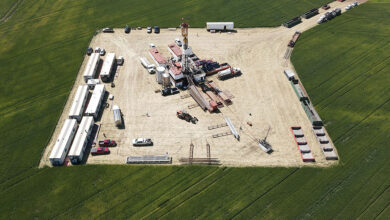Collins: Industry shouldn’t return to old normal but adapt itself to new energy world

After a difficult and often painful couple of years, the drilling industry is itching to get back to work and return to “normal.” Yet, returning to the old normal is not necessarily a good thing, Michael Collins, VP Wells Joint Ventures for Shell, said at IADC World Drilling 2017 last week. “I think there’s a massive opportunity for us to evolve,” Mr Collins said on 28 June in Amsterdam. “We can take advantage of a new norm. We can take advantage of evolving the way we plan our activities, the way we execute, the way we manage our people, our human resources, and the way we bring technology to bear to improve the robustness and longevity of the business. It’s about transformation.”
To transform and adapt for the future, the industry must first recognize that the energy transition is occurring on a global scale, he said. Renewables are playing a growing role in the energy space, and there is increasing support for alternative energy sources within the traditional oil and gas economy. “This energy transition is happening, and we must adapt and recognize it in our business. These renewable systems and alternatives are becoming increasingly competitive, technically and economically, and we must adapt to that world.”
This doesn’t mean that hydrocarbons are out. In fact, 80% of the current energy system still relies on hydrocarbons. “So we do need to recognize that there is a return to activity,” he said. However, the industry must be proactive in adapting itself to take on the energy transition and be ready to take on a new level of competitiveness in the new energy market. “If you were to ask me do I see a return to a previous cycle, I’m not sure. I think there’s an exciting place for evolution,” he said.
A second critical consideration for the industry is learning from the past. During the last period of high oil prices, massive investments surged into the oil and gas industry, inflating revenues and incomes. But where has the value gone from our business? “Record incomes masked a steady deterioration in the fundamentals of our industry,” Mr Collins said, noting that finding and development costs have risen, while return on capital has fallen. “That puts us out of competition with other sectors for investors.”
In fact, the offshore and onshore drilling sectors have seen some of the biggest gaps between revenue and profitability, he pointed out. “Oil prices have made an already challenging situation for the drilling industry much worse. So do we want to head back to that place? Is that the normal we want to return to?”
At Shell, preparing for the future is focused around three primary areas: running a safe, efficient and profitable business; sharing wider benefits with the societies in which it operates; and helping to shape a more sustainable energy future. This means directing more capital to renewable resources, limiting CO2 emissions and putting a much stronger focus on gases within its hydrocarbon mix. It also means a heavier emphasis on innovation, Mr Collins said. “Not necessarily innovation on technology or widgets, but innovation on where we do business, the way we assemble our organization and the way we manage our talent.” A core component of this process is transforming the supply chain to improve efficiency, he added. “It doesn’t mean screwing the margins so there’s nothing left. In many cases, it could mean spending more money, but we recognize that the way we’ve been working with our supply chain must evolve.”
Attracting and developing the workforce is another essential factor to success, and the industry must not forget about diversity and inclusiveness, Mr Collins urged. “It’s a topic that we, as a drilling industry, have been tackling for some time. Let’s face it – we’ve not done a great job… We do have a true opportunity to act through the next cycle because it’s clear that diversity and inclusiveness can create returns.”
Numerous studies have confirmed that a diverse and inclusive workforce provides benefits in creativity and decision-making and leads to better relationships with customers and suppliers, he said. “We are in a battle for talent, and the talent landscape is more different now than it’s ever been… Unless we evolve the way we want to attract and retain staff, we will be left in a deficit.”




